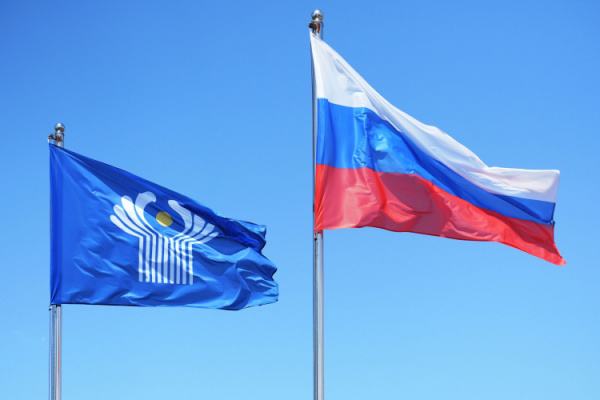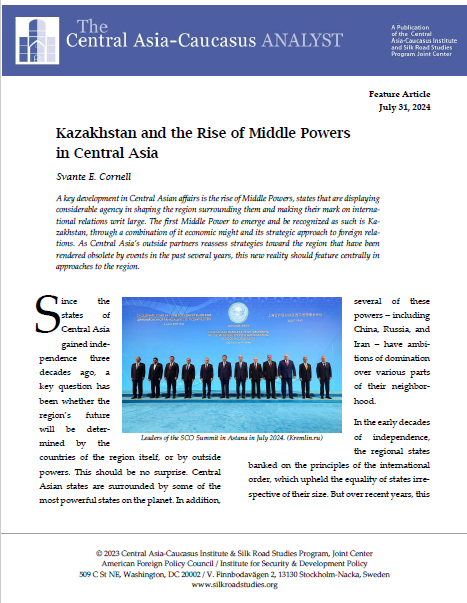The New Challenge to the SCO
THE NEW CHALLENGE TO THE SCO
By: Stephen Blank
The recent summit of the Shanghai Cooperation Organization (SCO) in Astana reveals that both Moscow and Beijing are seeking to reformat the organization in order to meet their global rather than its original regional goals. That process represents a serious challenge to the foreign policy autonomy and interests of Central Asian states and probably to regional security. As the center of gravity of world politics shifts ever more to Asia, the role and importance of Central Asia is likely to grow. These trends should be recognized and acted upon to assure that Central Asia does not become a closed sphere of Sino-Russian influence, which would retard its growth and transform it into a breeding ground for conflict.
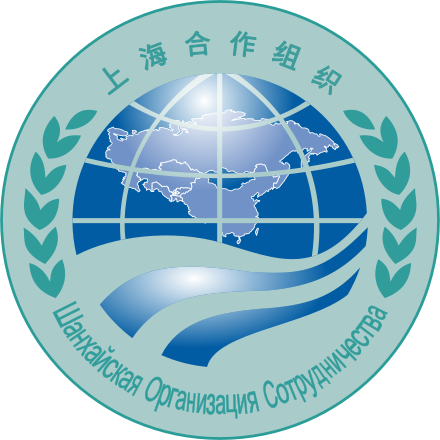
BACKGROUND: The SCO was first set up to create an institutional framework by which China’s growing importance in and to Central Asia could be regulated. At the same time, it also constituted a forum for Central Asian governments whereby they could address not only each other but also Russia and China concerning their interests and needs and where all the parties could reach agreement on how to contend with shared threats, e.g. the genuine and continuing threat of terrorism. As such the SCO gradually evolved into a viable regional security forum where both Moscow and Beijing could present or implement their regional security initiatives and Central Asian states could present their interests and needs. Thus, it functioned to satisfy all the members’ needs as a purely regional security organization.
However, as world politics evolved towards a world order characterized primarily by great power rivalry and even threats of nuclear confrontation, Russia and China clearly intend to impart a wholly new purpose and direction to the SCO that threatens the interests of the Central Asian states. Membership now includes India, Pakistan, Iran, and Belarus. These additions to the SCO’s roster are primarily attributable to Sino-Russian maneuvers – great power calculations that outweigh regional concerns. Moreover, these new members of the SCO have also brought their rivalries, especially those between India and Pakistan over Afghanistan and Kashmir, and India and China over China’s Belt and Road Initiative (BRI), into the SCO, probably rendering the organization less effective as a security provider. Finally, Russia’s war in Ukraine has also undermined its reputation as a security provider in Central Asia, not least because high-ranking scholars like Sergei Karaganov and officials regularly make veiled and even unsubtle threats against Kazakhstan, which they claim to be part of Russia.
Recent trends, as expressed at the SCO summit in Astana and other high-level Russo-Chinese gatherings, indicate that both Russia and China have abandoned the idea that the SCO serves mainly as a regional security institution. In numerous speeches, Putin, Xi, and spokesmen for their policies now openly state that the SCO, like the BRICS, manifests a new and evolving form of multipolar politics led by Moscow and Beijing, which herald the rise of the East and South against a supposedly decrepit West. In this self-serving ideological depiction of the emerging world order, these formerly regional or economic organizations function to attack the West and validate Moscow’s and Beijing’s hegemony over weaker neighbors like Central Asia. This hegemony entails an unquestioned division of the world into spheres of influence and the extreme minimization of foreign influence in Central Asia.
IMPLICATIONS: In this new world order, Russia’s visibly declining hegemony over Central Asian security and culture would be restored, possibly by force, and to judge from ongoing economic trends, under Chinese sufferance. While this may well be a delusional dream, it now holds sway in Moscow and represents another desperate effort to hold on to the wrecks of empire. As Sergei Radchenko demonstrates in his superb account of Soviet foreign policy, Moscow cannot claim the mantle of great power and imperial status if it lacks willing clients. Therefore, it will consistently attempt to subordinate its neighbors, including Central Asia.
China shares this imperial world view. Its methods in Russia and Central Asia are primarily economic, yet no less coercive than Russia’s more heavy-handed approach. However, Beijing is happy for now to let Russia bear security burdens that it prefers to avoid, given the challenges it faces in Korea, the South China Sea, and India. And it certainly welcomes Russia’s growing dependence on China in economics and as provider of strategic technologies.
If this interpretation of the SCO gains traction, it entails several challenges to Central Asian members and India. First, the vision of the SCO as a Sino-Russian artifact of a multipolar order entails a diminution of Central Asian states’ sovereignty as free international actors. Beijing and Moscow will seek to coerce them into following their agenda, not a Central Asian one. The idea that the SCO is merely an artefact of a great power struggle over multipolarity and spheres of influence not only justifies pressure upon Central Asia to oust U.S. and European presence and influence from the region. It also aims to curtail Central Asia’s increasing outreach to the West and vice versa that is now finally taking place. This exclusionary Sino-Russian approach can only lead to economic isolation, stagnation, and subordination to Moscow and Beijing when both those economies have long since entered upon their own periods of stagnation.
Second, the triumph of this view of the SCO enhances Russia’s and China’s economic leverage on Central Asia. It allows Moscow to continue threatening Central Asian migrants and economies by playing the increasingly popular anti-migrant card in Russian politics. Beijing will similarly employ the leverage it possesses through trade and investment deals to coerce local governments into an inferior position, especially if other alternatives are unavailable.
Third, Russian and possibly Chinese military threats, particularly against Kazakhstan, will increase. And fourth, at the same time Moscow and China will collaborate at China’s behest, given Russia’s extensive dependence on China, to exclude India from future major trade and transport routes as China has already done. Thus, the SCO will become a vehicle whose purposes also comprise the stifling of India’s growing power and interests in Central Asia. One form these processes will likely take is already underway whereby Russia will seek alignment with Afghanistan, ostensibly to stop terrorism and reaffirm its military hegemony over Central Asia. Indeed, its ambassador to Kabul now proclaims an alliance between the two states, an alliance that can only suppress Indian and Central Asian interests in expanding ties.
As part of this projected reorientation of the SCO, therefore, it will be subordinated to the exigencies of great power rivalry with the U.S. while the Sino-Indian rivalry in Asia will be institutionalized within it. The consequences may to some degree be unforeseeable; but are unlikely to redound to the benefit of Central Asian governments.
CONCLUSIONS: For interested parties, i.e. not only regional governments, but also the U.S. and the EU, it is necessary to prevent the resubordination of Central Asia to the renewed imperial fantasies of Russia and China. This entails constant high and low-level interaction among these states with regard to critical issues: terrorism, which clearly remains a real threat, future ties to Afghanistan, bilateral and multilateral energy, trade, transportation routes, rare earths, environmental reclamation projects, education, and defense cooperation. Only by such means can the West and its leading organizations contribute to the preservation of regional peace, trade, investment, growth, and mitigate looming environmental threats in Central Asia.
India too must step up its game here and realize the long-held but unfulfilled promise of enhanced ties with and support for Central Asia by carrying out an increasing number of projects on this same agenda with local governments. This would forestall a Chinese-led but Russian-supported effort to curtail Central Asian ties with both the West and Asia’s other key players. The newly announced South Korean plan for increased ties with Central Asia exemplifies what could be done.
Finally, both the West and leading Asian powers should lend growing support to the rising trend among Central Asian states to enhance their mutual and regional cooperation. To the degree that foreign support and local perceptions foster regional cooperation on the many challenges facing Central Asia, they enhance local and regional capabilities while also raising the cost to Beijing and Moscow of interference in Central Asia. In other words, Western support for individual country projects and especially for multilateral cooperative projects encompassing the agenda presented above, are win-win and mutually beneficial. They build peace, economic growth and development, and preserve the sovereignty and territorial integrity of Central Asian states that is openly at risk from both Beijing and Moscow.
Enhancing Western influence and regional cooperation are proven ways of reducing conflict whereas spheres of influence invariably foster neo-imperial rivalries. The masquerade of Sino-Russian multipolarity will not have different results if we neglect Central Asia. Instead, we will only increase the costs to that region and to our own interests.
AUTHOR’S BIO: Stephen Blank is a Senior Fellow with the Foreign Policy Research Institute, Fprpi.org.
Kazakhstan and the Rise of Middle Powers in Central Asia
Svante E. Cornell
July 31, 2024
A key development in Greater Central Asian affairs is the rise of Middle Powers, states that are displaying considerable agency in shaping the region surrounding them and making their mark on international relations writ large. The first Middle Power to emerge and be recognized as such is Kazakhstan, through a combination of it economic might and its strategic approach to foreign relations. As Central Asia’s outside partners reassess strategies toward the region that have been rendered obsolete by events in the past several years, this new reality should feature centrally in approaches to the region.
Russia’s Retreat and Counterattack in Central Asia
By Stephen Blank
May 9, 2024
Russian power is retreating from the Caucasus and Central Asia, most prominently with the withdrawal of Russian peacekeepers from Nagorno-Karabakh and Washington’s concurrent decision to open discussions with Yerevan on military support. The same process is discernible in Central Asia in the lukewarm support for the war in Ukraine and Kazakhstan’s critique of that war. Other harbingers of the trend are the gradual erosion of Russian language use and China’s dominance in regional finance, trade, and investment. Nevertheless, Moscow still deploys substantial leverage over Central Asia and individual states and can conduct purely domestic policies that negatively affect Central Asian governments and citizens. Moreover, recent indicators suggest that Russia is launching a campaign to restore its hegemonic position in Central Asia. Thus, despite the war in Ukraine and the burdens it has imposed, current Russian policies in Central Asia amount to a determined resistance to its equally observable retreat.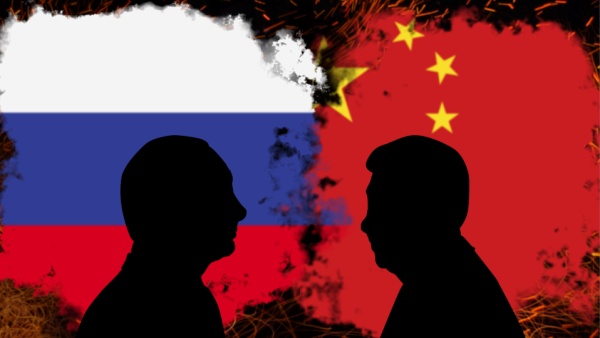
Is This Turkey’s Hour in Central Asia?
By Stephen Blank
February 9, 2024
Virtually every assessment of trends in Central Asia since Putin’s full-scale invasion of Ukraine in 2022 and many preceding analyses have postulated a decline in most if not all dimensions of Russian influence and capacity. To be sure, Russia’s imperial aspirations and ability to indulge in them remain central to Russian policy. Nevertheless, that capacity and ability to give this area the attention it merits has visibly declined, not least regarding defense policy. That decline has opened and continues to create opportunities for other interested parties to raise their regional profile, including China, Turkey, India, the EU, and the U.S.
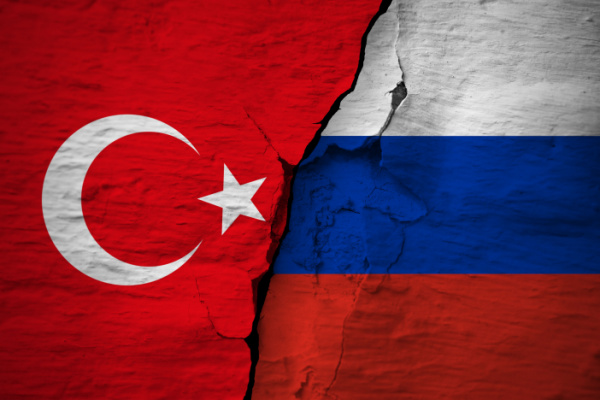
The Informalization of CIS and Formalization of EEU: Russia’s Strategy to Maintain Leverage in its Neighborhood
By Farkhod Tolipov
January 25, 2024
On December 25-26, 2023, two summits were held in Saint Petersburg: the Eurasian Economic Union (EEU) summit and the so-called CIS informal summit. They can be regarded as a joint summit of two organizations with similar goals. In fact, in its attempt to prevent the fate of a fading empire, Moscow seeks to resort to its soft power instruments and create a semblance or entourage of collectivity around Russia. In the context of its war in Ukraine and frequent unfriendly and threatening statements towards its neighbors, the Kremlin’s artificial collectivity looks like a disguise of its loneliness.
